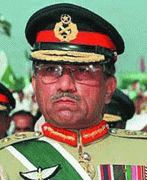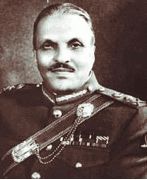Crisis of Legitimacy
By I. A. Rehman | Opinion | Viewpoint | Published 22 years ago
 Those advising General Pervez Musharraf to get himself elected as president for the post-election period through a referendum should not be considered his friends. They are pushing him down a slippery path towards an uncertain future.
Those advising General Pervez Musharraf to get himself elected as president for the post-election period through a referendum should not be considered his friends. They are pushing him down a slippery path towards an uncertain future.
While constitutional experts consider a referendum, as a means of direct legislation by voters instead of their representatives in legislatures, suitable only for those societies enjoying high levels of voter-training and considerable experience of the process involved, its application in Pakistan can only raise a host of questions on the credibility of the outcome.
The referendum idea has been very cursorily discussed in Pakistan. The constitution of 1973, which is in abeyance at the moment but which is expected to be revived after the general election in October 2002, had no provision for a referendum in its original text. In April 1977, during the PNA agitation, Prime Minister Zulfikar Ali Bhutto thought of holding a referendum to determine whether he enjoyed majority support in the country. Article 96 A was accordingly added to the constitution, with effect from April 21, 1977.
According to this amendment, if the prime minister considers it necessary to obtain a vote of confidence of the people of Pakistan through a referendum he can advise the president to resolve the matter through referendum. For this purpose a law was to be made to provide for the constitution of a Referendum Commission and the procedure for conducting the exercise. However, the constitutional provision stipulated that under the proposed law, all registered voters would be entitled to take part in the referendum; that any dispute over the counting of votes was to be decided by the Referendum Commission and the courts’ jurisdiction was barred, and if the prime minister failed to secure a majority of the total votes cast he was to be deemed to have resigned. However, the idea of a referendum was soon given up. Following the imposition of martial law in July 1977, the relevant article ceased to be in force from September 13, 1977, under General Zia’s orders. Apart from exchanges between the government and the PNA, and that too in the heated climate of a fierce agitation, the people had little opportunity to debate the referendum proposal and examine its rationale or its essential requisites.
Seven years later, General Zia held a referendum under an extra-constitutional decree, the Referendum Order 1984 (President’s Order 11 of 1984), and it was an outrageously farcical affair. There was no rational nexus between the question in the referendum (whether the people supported the Islamisation process) and the conclusion (the election of General Zia-ul-Haq as president). From all accounts no more than 10 per cent of the voters turned out to cast their votes although the Election Commission claimed a nearly 100 per cent yes vote.
It was after the December 1984 referendum that General Zia made two amendments to the constitution on the subject vide PO 14 with effect from March 2, 1985. One of these was the insertion of clause (7) in Article 41 which said that notwithstanding anything in the constitution, especially Article 43, General Zia-ul-Haq would become President for five years on the day of the first meeting of parliament in a joint sitting (after the 1985 election). This clause was intended to save General Zia from disqualification for presidentship under Article 41 (2), which required him to be qualified to be elected as member of the National Assembly (which he was not as he was a serving officer) and under Article 43 (which debars the president from holdings any office of profit in the service of Pakistan) as he continued as the army chief General Zia’s election was further protected under Article 270-A (1) vide the 8th Amendment.
The second amendment was the replacement of Article 48 with a new text which, among other things, provided for a referendum. Under the relevant clause the president, in his discretion or on the prime minister’s advice, could order a referendum on “any matter of national importance” in the form of a question that could be answered by a simple ‘yes’ or ‘no.’ Another clause said the parliament might lay down the referendum procedure in a law.
 If the precedent of 1984-85 is to be followed, the Chief Executive has to decide first whether to revive a part of the constitution and invoke its referendum clause of whether to hold the referendum under an order such as P.O. 11 of 1984. In either case a provision similar to Article 41 (7) will have to be put into the constitution, since the existing provision, which was related to General Zia alone, has become redundant. That will throw up the issue whether this amendment would fall within the permission granted by the Supreme Court of the Chief Executive to amend the constitution. What the Supreme Court has said is that the constitution could be amended to enable the Chief Executive to complete his agenda as declared before the court verdict. That should put a limit at the task to be carried out before October 2002 and any suggestion that the constitution might be amended to facilitate the Chief Executive’s task beyond the general election will generate a troublesome constitutional wrangle. If General Musharraf plans to hold the offices of both the President and the army chief, in the tradition of General Zia, the new amendment too will be required to make Articles 4(2), 43 and 63 (k) inoperative.
If the precedent of 1984-85 is to be followed, the Chief Executive has to decide first whether to revive a part of the constitution and invoke its referendum clause of whether to hold the referendum under an order such as P.O. 11 of 1984. In either case a provision similar to Article 41 (7) will have to be put into the constitution, since the existing provision, which was related to General Zia alone, has become redundant. That will throw up the issue whether this amendment would fall within the permission granted by the Supreme Court of the Chief Executive to amend the constitution. What the Supreme Court has said is that the constitution could be amended to enable the Chief Executive to complete his agenda as declared before the court verdict. That should put a limit at the task to be carried out before October 2002 and any suggestion that the constitution might be amended to facilitate the Chief Executive’s task beyond the general election will generate a troublesome constitutional wrangle. If General Musharraf plans to hold the offices of both the President and the army chief, in the tradition of General Zia, the new amendment too will be required to make Articles 4(2), 43 and 63 (k) inoperative.
That this scheme did not run into serious opposition in 1985 does not mean that it will escape controversy now. Some water has certainly flowed down the dry bed of the Ravi over the past 17 years. General Zia’s determination to hold on to his army chief’s office made his presidency questionable in the eyes of many. He could not even convince some of his senior army colleagues of the legitimacy of this arrangement.
Further, the language of Article 41(7) was deliberately kept vague to create the impression that since General Zia became president on the first day a newly elected parliament met in a joint sitting, this could imply the parliament’s endorsement of his election. This line of argument begs the question that the electoral college for the president’s election does not comprise parliament alone and that provincial legislatures constitute its equally important part. The issue of constitutional legitimacy remains unanswered.
A referendum held under the provision of the suspended constitution will raise the issue whether election of the head of state, for which a procedure has been outlined in the same constitution, is an undetermined matter of national importance, that is, a matter about which the basic law is silent and it is thus a fit issue for referendum. It is doubtful if any helpful precedent can be found in the states where a referendum has been provided for.
Besides, the framing of the question in the referendum will pose problems. A replication of the tactics used by General Zia is likely to convince fewer people than was the case in 1984, a situation that was magnificently summed up by Faiz in the couplet:
Dawat-i-bai’t-i-sheh pe mulzim bana
Koi inkar par, koi iqrar par
(When allegiance to power was demanded, those who said ‘yes’ and those who said ‘no’ were both considered offenders).
These reasons are obvious. Suppose it is said, as has been reported, that if the people want General Musharraf’s anti-terrorism drive to continue or his economic political reforms to be protected, this would signify his election as president. This is not a fair proposition. In a referendum the question has to be specific and voting for a package, which may include a variety of measures, is nowhere considered valid. For instance, does the anti-terrorism drive include posting of military officers on judicial tribunals, or giving the police a licence to kill? The people may agree that terrorism must be curbed but may not agree to the above measures. Likewise, does the economic reform package include the levying of general sales tax on medicines? It will be interesting to have a referendum on that question.
Above all, when all the labours required by a referendum have been gone through, there will be need for something like the 8th Amendment because legal instruments are needed to protect even the unchallenged writ of authority. Thus if the parliament is to be again obliged to adopt a validating amendment, one will be reminded of a wag’s observation in 1985 who said that if General Zia could get his 8th Amendment passed by parliament he might well have got himself elected by the legislators and the 1984 referendum became an unnecessary adventure in the pursuit of national opprobrium.
The crux of the problem is that the logic of authoritarianism produces a crisis of legitimacy that cannot be solved within such a system. Legitimacy can be secured only through democratic constitutionalism, which in today’s world is the minimum eligibility standard for anyone who wishes to rule over his people or to guide them out of troubled waters.
Mr. I.A. Rehman is a writer and activist living in Pakistan. He is the secretary general of the Human Rights Commission of Pakistan Secretariat.


